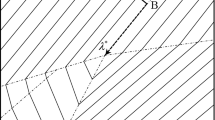Abstract
A simple procedure to tighten the Lagrangian bounds is proposed. The approach is interpreted in two ways. First, it can be seen as a reformulation of the original problem aimed to split the resulting Lagrangian problem into two subproblems. Second, it can be considered as a search for a tighter estimation of the penalty term arising in the Lagrangian problem. The new bounds are illustrated by a small example and studied numerically for a class of the generalized assignment problems.
Similar content being viewed by others
References
Bahiense L, Maculan N, Sagastizábal C (2002) The volume algorithm revisited: relation with bundle methods. Math Program 94:41–69
Bahiense L, Barahona F, Porto O (2003) Solving Steiner tree problems in graphs with Lagrangian relaxation. J Comb Optim 7:259–282
Barahona F, Anbil R (2000) The volume algorithm: producing primal solutions with a subgradient method. Math Program 87:385–399
Beasley JE (1993) Lagrangean relaxation. In: Reeves CD (ed) Modern heuristic techniques for combinatorial problems. Blackwell Sci., Oxford, pp 243–303
Everett H (1963) Generalized Lagrange multiplier method for solving problems of optimal allocation of resources. Oper Res 11:399–417
Fisher ML (1985) An application oriented guide to Lagrangian relaxation. Interfaces 15:10–21
Fourer R, Gay MD, Kernighan BW (1993) AMPL—A modeling language for mathematical programming. Scientific Press, Denvers
Frangioni A (2005) About Lagrangian methods in integer optimization. Ann Oper Res 139:163–169
Freville A, Hanafi S (2005) The multidimensional 0–1 knapsack problem—bounds and computational aspects. Ann Oper Res 139:195–227
Geoffrion AM (1974) Lagrangian relaxation and its uses in integer programming. Math Program Stud 2:82–114
Guignard M (2003) Lagrangian relaxation. TOP 11(2):151–228
Guignard M, Kim S (1987) Lagrangian decomposition: a model yielding stronger Lagrangian bounds. Math Program 39:215–228
Held M, Karp R (1970) The travelling salesman problem and minimum spanning trees. Oper Res 18:1138–1162
ILOG (2006) ILOG CPLEX, Mathematical programming optimizers. Version 10.0
Jeet V, Kutanoglu E (2007) Lagrangian relaxation guided problem space search heuristics for generalized assignment problems. Eur J Oper Res 182:1039–1056
Lasdon LS (2002) Optimization theory for large systems, 2nd edn. Dover, New York
Lemaréchal C (2001) Lagrangian relaxation. In: Junger M, Naddef D (eds) Computational combinatorial optimization. Springer, Heidelberg, pp 115–160
Lemaréchal C (2007) The omnipresence of Lagrange. Ann Oper Res 153:9–27
Litvinchev I, Rangel S (1999) Localization of optimal solution and a posteriori bounds for aggregation. Comput Oper Res 26:967–988
Litvinchev I, Tsurkov V (2003) Aggregation in large scale optimization. Applied optimization, vol 83. Kluwer Academic, Dordrecht
Litvinchev I, Rangel S, Saucedo J (2008) Modifying Lagrangian bounds. Technical Report 2008-01, Graduate Program in Systems Engineering, UANL, Mexico
Lorena LAN, Narciso MJ (1996) Relaxation heuristics for generalized assignment problem. Eur J Oper Res 91:600–610
Maculan N, Michelon P (1991) Lagrangean decomposition for integer nonlinear programming with linear constraints. Math Program 52(2):303–313
Maculan N, Reinoso H (1992) Lagrangean decomposition in integer linear programming: a new scheme. INFOR 30(1):1–5
Martello S, Toth P (1990) Knapsack problems: algorithms and computer implementations. Wiley, New York
Martin RK (1999) Large scale linear and integer programming: a unified approach. Kluwer Academic, Dordrecht
Narciso MG, Lorena LAN (1999) Lagrangean/surrogate relaxation for generalized assignment problems. Eur J Oper Res 114(1):165–177
Pentico DW (2007) Assignment problems: A golden anniversary survey. Eur J Oper Res 176:774–793
Shapiro JF (1974) A survey of Lagrangian techniques for discrete optimization. Ann Discrete Math 5:113–138
Author information
Authors and Affiliations
Corresponding author
Rights and permissions
About this article
Cite this article
Litvinchev, I., Rangel, S. & Saucedo, J. A Lagrangian bound for many-to-many assignment problems. J Comb Optim 19, 241–257 (2010). https://doi.org/10.1007/s10878-008-9196-3
Published:
Issue Date:
DOI: https://doi.org/10.1007/s10878-008-9196-3




